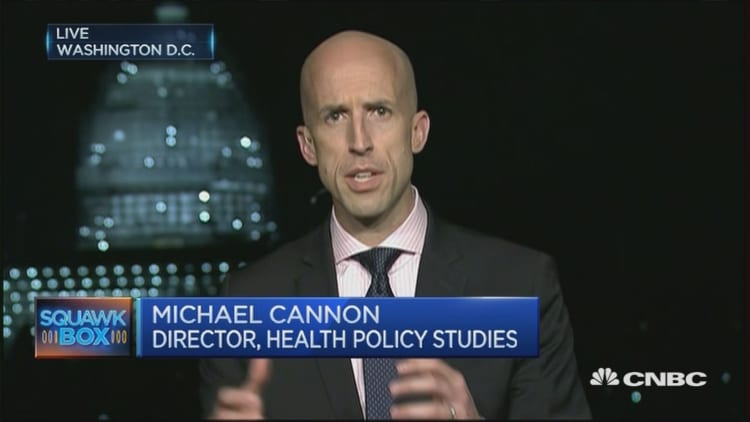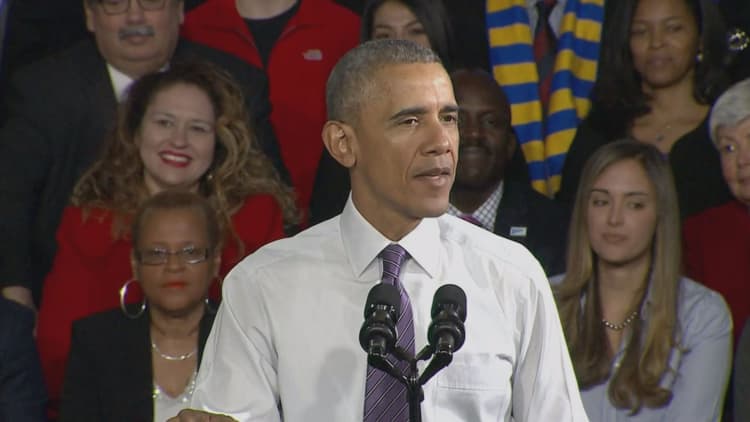Having Obamacare doesn't mean you'll understand Obamacare.
Texas has seen very strong enrollment growth in Obamacare health plans in recent years, but the people signing up often have a tough time understanding key insurance terms and how to use their coverage, a new report revealed Thursday.
The report found that Lone Star State residents who buy their own health insurance are significantly less confident about the meaning of terms such as premiums, deductibles and co-pays than people who get health coverage through their jobs or government-run programs including Medicare and Medicaid and the Veterans' Administration.
Buyers of individual health plans like those sold on Obamacare marketplaces also are less confident about how to find a doctor, figuring out which services and drugs are covered, and calculating how much services cost, according to the report by the Episcopal Health Foundation in Texas and Rice University's Baker Institute for Public Policy.
The findings are potentially troubling for Obamacare advocates. If the newly insured find it difficult to use their coverage, and are surprised by out-of-pocket charges they didn't anticipate, it could lead them some of them to drop their insurance plans, which in turn could lead insurers to hike premium prices.
"The unfortunate irony is that those with individual health insurance plans are the least likely to understand the basic terms, but they have the greatest need to understand them," said EHF President and CEO Elena Marks, who is also a non-resident health fellow at the Baker Institute.
"This group has to choose from a variety of health insurance options and pay much more of the cost of their insurance," Marks said. "It's critical that they understand what they are buying."
The report noted that, in contrast to Obamacare customers who select from a menu of plans offered by competing private insurance companies, people in employer-sponsored health plans or government-run programs "have comparatively few choices to make" about which plan they have. And people in public plans generally have limited opportunities to make decisions about how to use their coverage. Obamacare plans, as a rule, impose higher out-of-pocket costs on customers than other coverage options.

Vivian Ho, chair in health economics at the Baker Institute, said, "The long-term success of the Affordable Care Act depends on buying, using and experiencing satisfaction with health insurance.
"The lack of understanding about basic financial coverage provisions of health insurance plans can lead to surprise and frustration," Ho said. "That can undermine efforts to increase coverage."
More than 1.3 million Texans signed up for Obamacare plans for this year on the federally run insurance exchange HealthCare.gov, a 78 percent increase in enrollment in the state since 2014.
Texas has the second-highest number of Obamacare customers in the nation — trailing only Florida. Federal officials have said that eight of the 10 local coverage markets nationwide that saw the strongest enrollment growth this past sign-up season are located in Texas.
Almost half of the people who signed up for Obamacare coverage this year in Texas were new enrollees.
The findings in the EHF and Baker Institute report echo a previous study which found that about 25 percent of Texans with any kind of health coverage lack confidence in their knowledge of health insurance terms.
The report, which looked at confidence levels across people with different kinds of coverage, found that the biggest knowledge gaps were seen among customers of individual plans.
For example, the report found that more than 30 percent of people with individual plans in Texas said they were either "not too confident" or "not confident at all" about their understanding of the term "premium," which is the monthly charge that people must pay to maintain health coverage.
In contrast, 23 percent of people with Medicare or Medicaid expressed such a lack of confidence about what a premium is, and just under 16 percent of those with job-based coverage or through the military gave those answers.
The knowledge gap was even wider when people were asked about their confidence in understanding a deductible, which is the amount of money a person must pay out of pocket for health services before their plan covers the rest of the cost.
Thirty-three percent of individual health plan customers expressed little or no confidence in understanding what a deductible is, compared to just under 20 percent of Texas with Medicaid or Medicare, and less than 15 percent of people in job-based or military-based coverage.
Individual plan customers are about twice as likely to not be confident about what a "co-pay" is than are people in job- or military-based coverage: 24.1 percent versus 12.8 percent. A co-pay is the flat charge that a person must pay for each visit to a doctor or other health provider, or for a prescription drug.
Another large disparity in knowledge was found when people were asked about maximum out-of-pocket costs, which is the most they would personally be required to pay in a given year for health services obtained in their plan's network of providers.

More than 42 percent of individual plan customers said they had little or no confidence in their understanding of maximum out-of-pocket limits. That compares to just 21.4 percent of Medicare/Medicaid recipients, and 24.6 percent of people in job- or military-based coverage.
Likewise, the report found that people with individual plans were much less likely to be confident in figuring out how much they would have to pay if they sought medical services outside of their plan's network. More than 51 percent of those customers expressed little or no confidence when asked that question. Thirty-six percent of people with job- or military-based insurance gave those answers.
Individual health plan customers in Texas also showed much less confidence than their covered peers when asked which costs would count toward the deductible, what counts as preventative services — which are 100 percent covered by all insurance plans — and reviewing the explanation of benefit statements issued by their plans.
Marks, the head of EHF, said that the findings underscore an urgent need to improve consumer literacy among health insurance customers.
"It is important for all Americans to better understand this complex system so that they can make the best decisions about health insurance and health-care choices for themselves and their families," Marks said. "Those who've worked diligently to expand enrollment in health coverage must help the newly insured understand their plans."




